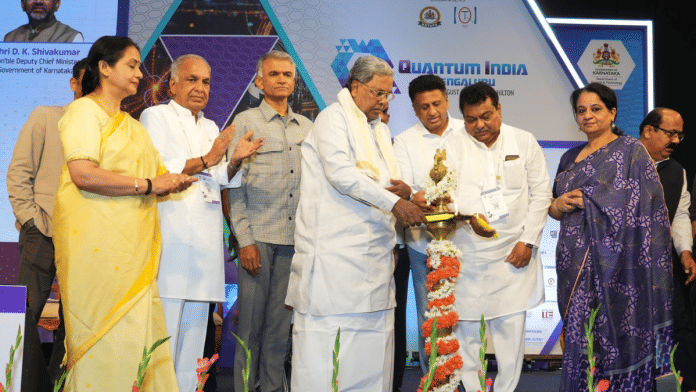Bengaluru: Karnataka is set to launch a Quantum Faculty Development programme to train over a thousand teachers and professors not just in quantum fundamentals but also in modern teaching methods.
“We are undertaking a ground-up transformation of our education system to make it quantum-ready,” Karnataka Minister of Science and Technology N.S. Boseraju told The Print.
“At the school level, we will introduce basic quantum science into the curriculum even in Kannada for higher classes,” he added.
The minister made the remark on the eve of the Quantum India Bengaluru Summit which was inaugurated Thursday. The summit is designed to address key areas of social structure and the technological sector such as diagnostics, finances, national security where technology can be revolutionary in future.
The plan is to modify the way quantum mechanics is taught traditionally. A significant portion of quantum mechanics involves mathematics such as linear algebra, solving differential equations beyond the reach of elementary school.
“Even when you do not have the mathematical background, quantum can be started even in the school,” said Arindam Ghosh, the convenor of the IISc’s Quantum Technology Initiative (IQTI).
The IQTI is an initiative launched by the Indian Institute of Science (IISc) to enable the development of quantum science and technology by bringing together physicists, material scientists, computer scientists and engineers.
As Ghosh puts it, the training is to make students think about quantum and they are ready by the time they come out of school.
One way is to integrate art into quantum education. For instance, how certain art forms like sculptures, dance forms can explore a better way of communication to figure out a way to interpret non-intuitive concepts like quantum entanglement.
The other way is to allow students and teachers to visit technology laboratories. Such visits are important to sustain curiosity in students until they mature enough to understand higher level mathematics involved in quantum mechanics, said Akshay Naik, professor at the Centre for Nanoscience and Engineering (CeNSE), at the IISc and a co-convenor of the IQTI.
He argued that emphasising equations and scientific explanations at school level might be difficult. “Just like a kid watching a sports car, they need to go and see some labs and be in awe of those instruments,” Naik added.
Quantum technology is taking baby steps and it is important for the country to have a skilled workforce. “We face a global shortage of quantum experts,” said Boseraju.
(Edited by Ajeet Tiwari)
Also Read: Karnataka is set for next generation leap, India’s first quantum summit kicks off in Bengaluru






